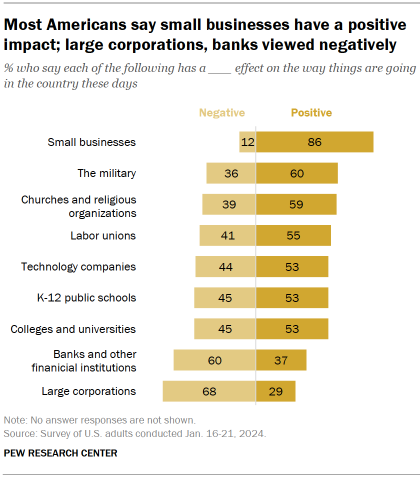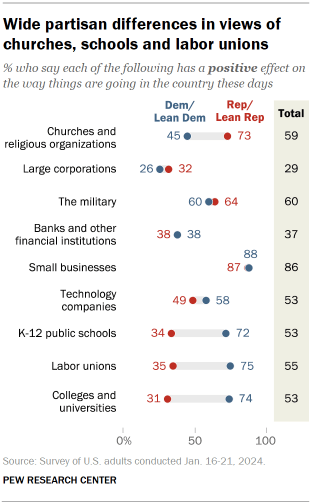Continued partisan divides on schools, unions, churches
Pew Research Center conducted this study to examine Americans’ views of different national institutions. For this analysis, we surveyed 5,140 U.S. adults from Jan. 16 to Jan. 21, 2024. Everyone who took part in this survey is a member of the Center’s American Trends Panel (ATP), an online survey panel that is recruited through national, random sampling of residential addresses. This way nearly all U.S. adults have a chance of selection. The survey is weighted to be representative of the U.S. adult population by gender, race, ethnicity, partisan affiliation, education and other categories. Read more about the ATP’s methodology.
Here are the questions used for this report, along with responses, and the survey methodology.
Americans overwhelmingly see small businesses as having a positive effect on the way things are going in the country.

By contrast, their views of large corporations are broadly negative. Most people – including identical shares in both parties – also are critical of the impact of banks and financial institutions.
A new national survey conducted by Pew Research Center from Jan. 16 to Jan. 21 among 5,140 adults also finds:
The U.S. military is viewed positively by 60% of Americans, and these views are similar across most demographic and political groups.
There are wide partisan divides on the impact of educational institutions, both K-12 public schools and colleges and universities:
- About three-quarters of Democrats and Democratic-leaning independents view colleges and universities positively, but only about three-in-ten Republicans and Republican leaners give these institutions positive marks. The partisan divide on K-12 public schools is about as wide.

Churches and religious organizations are viewed positively by about six-in-ten Americans, but there are sizeable differences in these views between Republicans and Democrats, as well as between the religiously affiliated and the religiously unaffiliated:
- Nearly three-quarters of Republicans (73%) say churches and religious institutions have a positive impact. Democrats’ opinions are more divided: 45% say their effect is positive, 53% say it is negative.
- And while religiously affiliated Americans generally rate the impact of organized religion positively, the views of unaffiliated Americans are more negative.
Views of the effect of labor unions also differ considerably by party:
- Three-quarters of Democrats, compared with just 35% of Republicans, say unions have a positive impact on how things are going in the United States these days.
Explore more detailed looks at demographic and political differences in Americans’ views of the impact of each of these institutions:
- Educational institutions: Colleges and universities, K-12 public schools
- Business: Small and large businesses, banks, and technology companies
- Labor unions
- Churches and religious organizations
- The U.S. military




